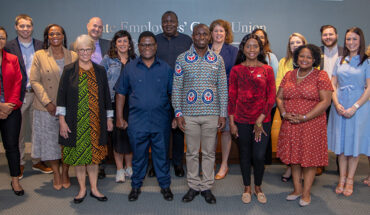Four decades in financial services inform Civic Federal Credit Union CEO Maurice Smith’s perspectives on the economy.
by Andrea Rice | photography by Eamon Queeney
Maurice Smith puts his community first. As the CEO of Local Government Federal Credit Union (LGFCU) and Civic Federal Credit Union (FCU), Smith has witnessed tremendous growth and change in the area over the years—and weathered a few downturns, as well. In August, Smith celebrated his fortyfirst year in the credit union business. Smith got his start in Durham at the State Employees Credit Union (SECU). He’s been recognized for his contributions to the industry, including the 2020 Herb Wegner Memorial Award for Outstanding Individual Achievement presented by The National Credit Union Foundation, and the 2019 Pete Crear Lifetime Achievement Award presented by the African-American Credit Union Coalition (AACUC), which also established the Maurice R. Smith Fund to offer scholarships for credit union personnel to enhance their careers. Born and bred in North Carolina, Smith hails from Southport, but has been in the Triangle since 1982. He is married with two adult children, and is also a Deacon at Wake Chapel Church. “The Triangle is a melting pot of people from different cultures, perspectives and backgrounds who’ve all come together to make this community what it is today,” he says. “That’s what I’ve found so gratifying about putting down roots here.” We caught up with Smith to learn about his experiences, and how he thinks credit unions can help pave the path toward recovery.
WHY DO YOU CALL YOURSELF A “CREDIT UNION GEEK?”
A credit union is owned by its members. We are cooperative. LGFCU serves local governments in North Carolina: 545 municipalities and 100 counties, including public-owned hospitals, airport authorities, fire departments, police officers and libraries. Essentially all levels of government that fall under state government are part of our field of membership. Local government has similar qualities to our credit union: in government, we elect leaders to represent us and take care of the business of governing our communities; for the credit union, the board of directors is elected by members to do the same. In government, every citizen has an equal vote and a voice in how their government operates. Here at the credit union, all members have an equal single vote.
SO WHAT DOES THAT MEAN IN TIMES LIKE THESE?
In June, we learned that we are officially in a recession. That creates all kinds of havoc for our communities; for the employment of our citizens; for the viability of our businesses. If you are a citizen of the Triangle, and times seem a little unnerving to you, you want to know that the institution with whom you trust your financial resources helps you make good decisions and understands who you are. We don’t know how to better do that than by having a democratic system so that all members are represented in what we do.
HOW IS YOUR CREDIT UNION PRIMED TO RECOVER FROM THE RECESSION?
What informs us about our viability in a market like this and our prospects for the future is how we have performed in the past. I came into this business in 1979, so in the four decades I have been in the credit union business, this is my fifth recession. I’ve seen inverted yield curves. I’ve seen unemployment go up and down. I’ve seen crime rates as high as 18 percent. I’ve seen trade imbalances. I’ve seen everything the economy can throw our way—except I have not seen a depression. In all of these economic cycles, the credit union model has done well. When the world seems a little uncertain, credit unions often grow faster because people are looking for safety.
HOW IS YOUR CREDIT UNION HELPING FOLKS HERE IN WAKE COUNTY?
When the recession began and the pandemic was ramping up, the federal government came out and asked financial institutions to be more generous with our depositors, offering extensions on loans, forgiveness on fees, forbearances and other arrangements. If a member says, “I think I’m going to have some trouble making my payments,” then we can help them weather the storm. We haven’t turned off our lending services, and we haven’t increased or changed our underwriting guidelines to make it tougher to get a loan. We have not closed out any lines of credit because we’re suspicious that somebody might not be creditworthy in the future. This inspires confidence in the community.
HAVE YOU NOTICED MORE PEOPLE DEFAULTING ON THEIR MORTGAGES OR RUNNING UP BIGGER LINES OF CREDIT SINCE THE RECESSION BEGAN?
During the recession in 2008-09, many consumers had difficulty making their mortgage payments. This recession is different. Many of our members called up ahead of schedule and said, “I’m going to have difficulty in the next 30 to 60 days. May I get help now?” That was tremendous; it shows that people have learned their lesson from the last recession. We think that’s going to shorten the recovery period, because we have learned to be smarter about how we help our members, offering financial counseling, planning services and consulting. But I like to believe it appears that the consumers are much smarter this time around. That’s very encouraging to me.
IN A RECENT BLOG, YOU WROTE, “THE LESSON YOUR CREDIT UNION LEARNS FROM PROTEST IS THAT SOCIAL UNREST IS AN OPPORTUNITY FOR US TO MEET A REAL NEED FOR PRODUCTIVE CHANGE.” COULD YOU ELABORATE ON THAT?
You can look at protests from a constitutional perspective: we as citizens have a right to seek redress from our government and have our voices heard. Since we serve a local government, they enforce and protect those rights. The protests happening here in our community and around the world are an opportunity for dialogue. Sooner or later the protests will cease, and the dialogue will ramp up. What I’m hopeful about is that we see real solutions come to bear. Civic is a financial institution; we are trained to think about financial services and products first. But with social unrest and protests, we think: what product do we have that can make a difference? The underpinning for much of that is access to fair, affordable financial services so that all communities can become more economically successful. I believe we can make a difference there.
HAVE YOU NOTICED ANY SIMILARITIES BETWEEN YOUR WORK AT CIVIC AND YOUR ROLE AS A DEACON?
There are remarkable similarities. The Biblical definition of a deacon is to be a servant. We are called to help people source the basic necessities for living—safe housing, food security and economic opportunities. Community service begins with a servant’s heart tobe supportive to others. This commitment arises no matter how one defines their role. This is the underlying thinking of Civic. The very notion of cooperative credit is built on the ideals of civic responsibilities. Members of Civic are not mere customers. They have an equity and philosophical stake in the institution. This is an important awareness for community growth. Members are right to believe that Civic’s main motivation for service is to advance the welfare of the community. It’s this interconnection that makes us a community in the first place.






